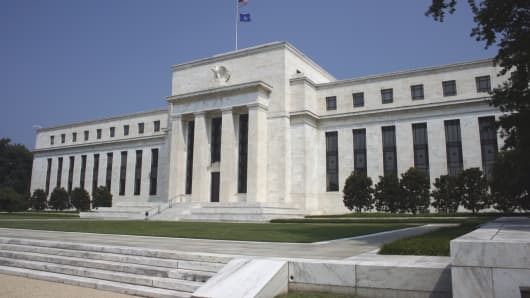If you've been busy this week doing, well, anything, you've probably missed the fantastically wonkish, dorky debate about the future of monetary policy, fiscal policy and the declining distinction between them carried on by Steven Randy Waldman of Interfluidity and Paul Krugman of the New York Times.
A good entry point right now is Tim Duy's post at Economist's View, where he explains what Waldman and Krugman are discussing.
One thing that is clear from the discussion is that the Federal Reserve's ability to pay interest on reserves is very likely to become a potent and important tool in the future. For most of the history of the Fed, reserves earned no interest at all. But starting in 2008, the Fed began paying interest on reserves. Which is to say, a bank formerly had to lend money to earn interest income; now a bank can earn interest income from the Fed for its reserves.
This isn't a big deal right now because the interest rate on reserves is very, very low—just above the Fed Funds target rate. What's more, the demand for credit is low as well, so this isn't widely seen as something that is denying people loans.
But we will probably not always have ZIRP. When the Fed decides that it wants to raise rates, it will very likely raise the interest it pays on reserves. Waldman forecasts that the interest on reserves will likely be very close to the Fed Funds rate. This is a powerful tool for monetary policy because it raises the costs for banks to borrow reserves, which means that they'll charge more for loans, which puts the breaks on economic expansion and inflationary pressure.
From a technocratic perspective, this all works out just fine. But look at it from a political perspective. When the Fed is paying banks tens of billions of dollars not to lend out money—at a time when the public's demand for loans has risen—this is going to be explosive. Think about all the times you hear about "free money from the Fed." That will literally be true when the rates on reserves grow.
What's more, this will actually be "taxpayer money." The payments on reserves will diminish the Fed's payments to the Treasury, which will mean that the government will have to tax more or borrow more than it otherwise would. A populist who described this as a permanent TARP really wouldn't be that far off.
It's hard to predict how this dynamic will play out. It could threaten the independence of the Fed. It could also threaten the independence of banks. If they are getting billions of taxpayer money, shouldn't they be directed by elected officials to serve public purposes? If there's one rule in politics it is this: all money comes with strings attached. I doubt interest on reserves will be the first unstrung money ever to arise in the history of governments.
Follow me on Twitter @Carney



